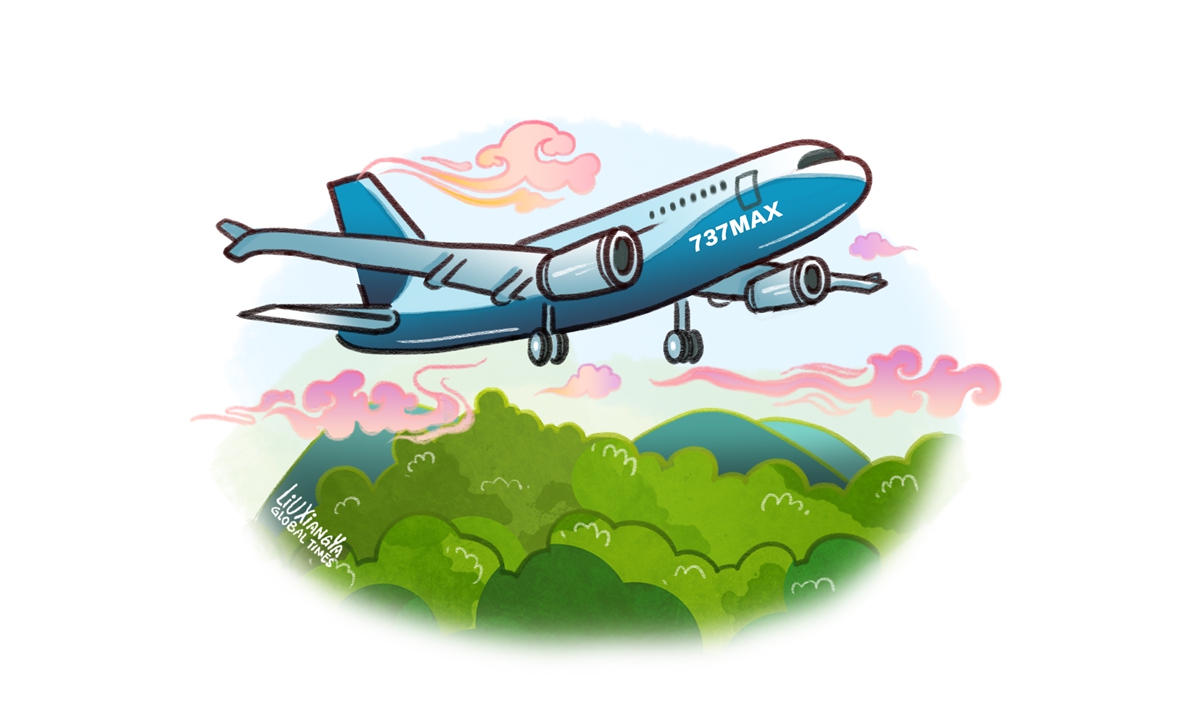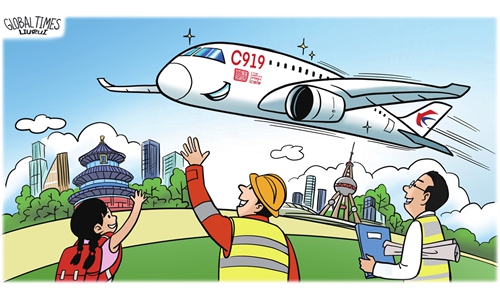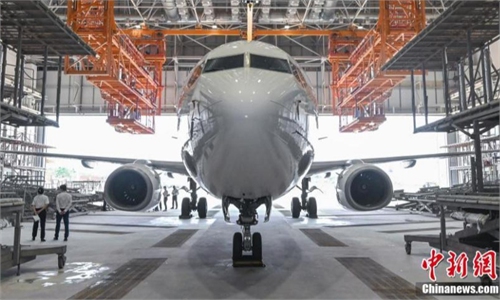
Illustration: Liu Xiangya/Global Times
About 90 percent of Boeing's China 737 MAX jets have resumed commercial operation as of the end of June, the US aircraft maker said on its official WeChat account on Wednesday. China is a major focus for US businesses. That's why the US business community wants a rational China policy adopted by Washington that will stabilize bilateral relations and avoid a downward spiral between the US and China, with the latter being an increasing important overseas market for them.China's civil aviation industry is picking up the pace of recovery since the country optimized epidemic prevention and control measures late last year. Domestic services have fully recovered and exceeded pre-pandemic levels, with the number of passengers travelling by air transport on domestic routes showing an increase of 2.6 percent in May over the same period in 2019. This year's rapid recovery not only provides enormous opportunities, but also heats up competition, in which Boeing cannot lose, as the US aircraft maker cannot afford a failure in the world's second largest civil aerospace and aviation services market.
Boeing estimated in April that half of China's MAX fleet was in operation, according to Reuters. From half to 90 percent, Boeing took only about two months, reflecting Boeing's urgency in boosting its presence in the Chinese market. The aerospace giant saw over $5 billion net loss in 2022 as higher production costs and supply-chain problems offset rising revenue. Under pressure, Boeing cannot miss the opportunity offered by a promising recovery for China's civil aviation industry.
In January this year, Boeing Chief Executive Dave Calhoun voiced hopes that a visit to China by US Secretary of State Antony Blinken would lead eventually to "robust" plane orders, Reuters reported. Blinken arrived in China on June 18. This is the first visit to China by a US Secretary of State in nearly five years, and also the first cabinet official of the Biden administration to visit China. Following Blinken's visit, US Treasury Secretary Janet Yellen was quoted by media reports as saying on Wednesday that she hopes to travel to China to reestablish contact with Beijing. A series of news reports are likely to boost Boeing's confidence and accelerate its steps in the Chinese market. Hopefully US officials won't disappoint Boeing.
However, Boeing faces fierce competition within the aerospace industry, particularly from Airbus. In April, Airbus received an around $20 billion order from China Aviation Supplies Holding Co for 160 commercial aircraft purchase, including 150 A320 family aircraft and 10 A350-900 wide-body aircraft, reflecting a strong demand for new airplanes by Chinese carriers. The package deal is made as French President Emmanuel Macron made a state visit to China. Macron's visit is the first time a European leader visited China after China fully reopened exchanges with other countries, which has created a favorable atmosphere for French enterprises to tap into the Chinese market.
However, amid fierce competition, Airbus' $20 billion order means Boeing has lost $20 billion worth of market opportunities in China. Some politicians in Washington want to "de-risk" and diversify US relationship with China, but economic "decoupling," or forming economic "small circles" that exclude China will not be conducive to US businesses. Those American lawmakers who talk all day about economic decoupling are hurting US companies.
Boeing is the largest manufacturing exporter in the US. Its business performance in the Chinese market is, to some extent, a barometer of China-US trade. US' exports to China, its important trading partner, continued to decline in the first five months this year amid Washington's "decoupling" push that is hurting normal bilateral ties. Bilateral trade came in at $274.7 billion in the January to May period, down 12.3 percent year-on-year. China always welcomes foreign companies and will give them greater access. But how the American companies will share the dividends brought about by China's economic growth also depends on the attitude of the US side, and relying solely on China's efforts is not enough.
The author is a reporter with the Global Times. bizopinion@globaltimes.com.cn


